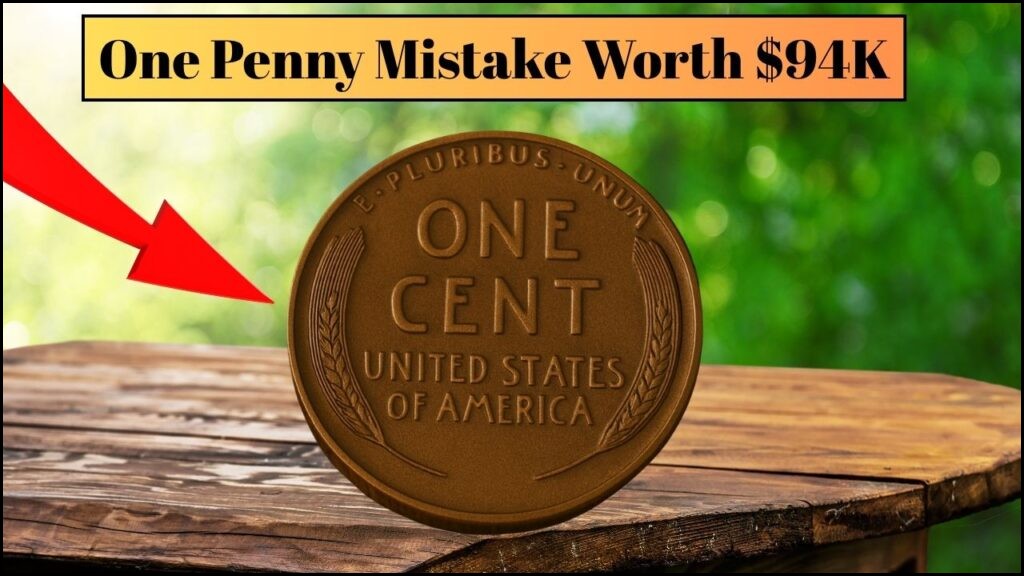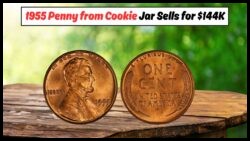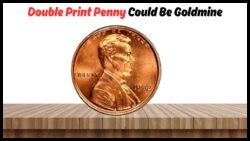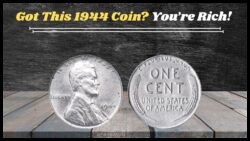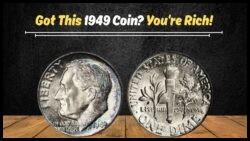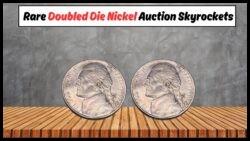1¢ Coin – Have you ever glanced at a penny and tossed it aside thinking it’s just spare change? Well, think again. That tiny 1-cent coin in your pocket or drawer could be worth a life-changing $94,000—yes, you read that right! One simple minting mistake or rare feature could skyrocket the value of your ordinary-looking penny. Coin collectors across the U.S. are willing to pay huge sums for specific error coins and rare editions, and if you know what to look for, you might just strike gold… or copper! This article will guide you through the most valuable pennies in circulation, what makes them so special, and how you can check if you own one of these hidden treasures. Whether you’re a seasoned collector or a complete beginner, this could be your chance to uncover a fortune hiding in plain sight.
What Makes a Penny Worth Thousands?
Not every old penny is valuable, but some key features can increase its worth dramatically. These features often include minting errors, rare compositions, or limited-edition prints.
Here are the top reasons a penny may be worth big money:
- Minting errors like double-dies, off-center strikes, or missing elements.
- Rare metals like copper instead of zinc (especially in transitional years).
- No mint marks when they should exist.
- Low mintage years (fewer coins produced).
- Collector demand based on rarity and history.
Now let’s dive into the actual coins worth checking in your stash.
Most Valuable U.S. Pennies You Might Own
Some of the most valuable pennies are already out there in circulation or tucked away in old jars. Here’s a table of the most valuable ones and their current estimated worth:
| Penny Type | Year | Mint Error/Feature | Estimated Value |
|---|---|---|---|
| 1943 Bronze Lincoln Cent | 1943 | Made of bronze instead of steel | $94,000+ |
| 1955 Doubled Die Penny | 1955 | Clear doubling on date & lettering | $1,500–$15,000 |
| 1983 Double Die Reverse | 1983 | Doubling on “ONE CENT” & “E PLURIBUS” | $200–$2,000 |
| 1992 Close AM Penny | 1992 | AM in “America” is very close | $500–$25,000 |
| 1995 Doubled Die Obverse | 1995 | Doubling visible on “LIBERTY” | $20–$1,200 |
| 1982 Small Date Copper Penny | 1982 | Rare copper small date variant | $100–$500 |
| 1970-S Small Date | 1970 | Slight font variation, hard to spot | $50–$3,000 |
How to Spot the $94,000 Penny
The most famous penny on the list is the 1943 Bronze Lincoln Cent. Most 1943 pennies were made of steel due to wartime copper shortages. However, a few bronze planchets (blanks) mistakenly got used during the minting process.
Key identifiers of a 1943 Bronze Penny:
- Not magnetic (steel versions are).
- Weighs 3.11 grams instead of 2.7 grams.
- Looks like a typical copper penny, not silver.
Tip: Use a magnet and a scale. If your 1943 penny isn’t attracted to a magnet and weighs more than 3 grams—get it appraised immediately.
Common Penny Errors That Add Value
You don’t need to own a 1943 penny to hit the jackpot. Many common pennies have hidden minting errors that dramatically increase their worth.
Some common and valuable mint errors:
- Off-Center Strike: Coin image is misaligned.
- Double Die: Letters or numbers appear doubled.
- Die Cracks: Raised lines caused by cracks in the die.
- Missing Letters/Designs: Incomplete details due to weak strike.
Here’s a quick look at these errors and their possible worth:
| Error Type | What to Look For | Value Range |
|---|---|---|
| Double Die | Doubling on text or numbers | $20–$15,000 |
| Off-Center Strike | Image not centered properly | $10–$1,000+ |
| Die Crack | Visible raised lines or bumps | $5–$500 |
| Blank Planchet | No design on one or both sides | $50–$300 |
| Broadstrike | Coin looks wider than usual | $30–$200 |
How to Check Your Pennies at Home
You don’t need fancy equipment to start identifying valuable pennies—just a few basic tools and careful observation.
Here’s how you can begin:
- Gather your change jar or old coin collections.
- Separate pennies by year, starting with older ones (pre-1983).
- Use a magnifying glass to examine lettering and details.
- Check the weight using a small gram scale.
- Use a magnet to check for copper vs. steel.
- Compare with online guides or consult a coin expert.
Where to Sell Rare Pennies
Found a penny that looks valuable? Don’t rush to spend or sell it until you’re sure.
Best options to appraise and sell:
- Coin appraisal shops or numismatic dealers.
- Online platforms like eBay (with caution).
- Coin shows or exhibitions.
- Collectors’ forums like CoinTalk or PCGS.
Always get your coin professionally appraised before selling—it could make the difference between $50 and $50,000.
Bonus Tip:
Have your coin graded and authenticated by NGC or PCGS for maximum value and buyer trust.
Your old pennies might be hiding incredible value. With one simple mistake during minting, a 1-cent coin can become a five-figure treasure. Whether it’s the 1943 bronze Lincoln or a common doubled-die error, the key is awareness. So before you drop that penny in a donation box or vending machine, take a closer look—you might just be holding a fortune in your palm.
FAQs
Q1: How do I know if my penny is made of bronze or steel?
A: Use a magnet. Steel pennies stick; bronze ones don’t.
Q2: Are all 1943 pennies valuable?
A: No, only the bronze ones. Most 1943 pennies are steel and worth less.
Q3: Can I check my penny’s value online?
A: Yes, sites like PCGS, NGC, and Numista provide guides and value ranges.
Q4: What’s the safest way to sell a valuable penny?
A: Use a certified coin dealer or get your coin graded before selling.
Q5: Do new pennies have any value?
A: Occasionally, if they have mint errors like double dies or misprints.

